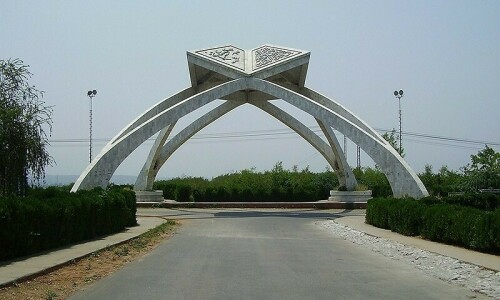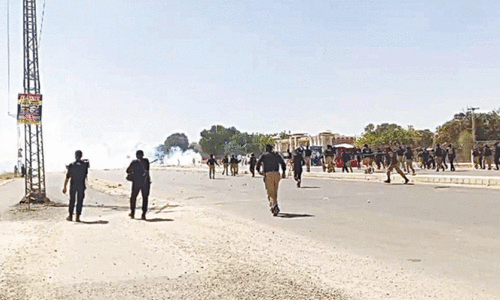IN a shocking move, the government has dropped all pretence of respecting constitutional rights and democratic processes by introducing a presidential ordinance to amend the Prevention of Electronic Crimes Act, 2016.
The amendment’s mala fide intent is clear: it seeks to protect any government or state functionary from criticism, and enables swift action against those who criticise or voice dissent, in a major attack on the right to freedom of speech and press freedom.
The fact that this amendment was introduced as an ordinance, without any stakeholder consultation, no debate in parliament nor in any of its committees, and simply announced by the cabinet is highly undemocratic and unconstitutional. Under Article 89 of the Constitution, the president can pass an ordinance in times of emergency when parliament is not in session, but in this case, parliament was in session just two days before, and another session of the National Assembly was cancelled at the last minute. Also, there is no impending emergency that requires the government to start arresting, jailing and sentencing dissidents.
Editorial: Bypassing elected representatives to approve contentious laws has become a norm for PTI
Under this ordinance, four main changes have been made to Peca. The definition of “person” has been expanded to “any company, association or body of persons whether incorporated or not, institution, organisation, authority or any other body established by the Government under any law or otherwise”. This means that while previously only aggrieved persons could file a complaint and case, now any company or government institution can invoke Peca. The intent seems to be clear from the statements of cabinet members who have been saying that criticising the military and judiciary needs to be controlled, and this amendment is in line with that.
The ordinance to amend Peca shows that those in charge now want the country to be a police state.
The bulk of changes have been made to Section 20 of Peca which is titled ‘Offences against dignity of a natural person’ has been amended in line with the first amendment to remove the term “natural”, meaning that this criminal defamation clause can now also be used to protect the “dignity” of organisations, companies and institutions, or that any body established by the government can now invoke this against anyone who they deem “intentionally and publicly exhibits or displays or transmits any information through any information system, which he knows to be false, and intimidates or harms the reputation or privacy of a person”. Moreover, the punishment under Section 20 has been increased to five years from three.
Furthermore, under Section 20, another amendment adds that an aggrieved person could be “a member of the public in respect of a public figure or a holder of public office”, effectively protecting the ruling elite belonging to any institution from criticism and dissent.
Section 20 has also been made non-bailable, non-compoundable and cognisable, with powers that have been given to the Federal Investigation Agency (FIA) under Peca. This means that anybody can be jailed immediately for criticising the state without chances of bail, and remain so despite an out-of-court settlement.
In another change to Section 20, the proviso that previously protected the electronic media from liability under this section has been deleted, which means that this now applies to all programmes on television as well. This should be a lesson for the electronic media regarding the need for unity. Under the previous PML-N government, the electronic media tried to only protect itself when this law was first proposed.
The ordinance also amends Section 44 of Peca by mandating that trials be concluded “expeditiously, but preferably not later than six months of taking cognisance of the case”, and further directs the courts to submit a monthly report to the high court regarding pending cases, which is overstepping the separation of powers and undermining the independence of the judiciary.
These changes signal a major change in approach of those in power who are now blatantly trying to become a police state, with stipulations worse than those under explicit martial law regimes which Pakistan has seen many of. This was evident from the recent remarks of the Islamabad High Court Chief Justice Athar Minallah in the case of media owner and commentator Mohsin Baig. The latter was arrested, on the complaint of Communication Minister Murad Saeed, in an illegal manner over some remarks he made on a TV talk show. Baig had criticised the minister, using a veiled reference to a published book.
Instead of filing a case against the author of the book, the regime is now going after those who refer to its contents — not by filing a libel charge but by allowing the FIA to abuse its powers under the draconian Peca and detain and torture Baig, launching a misogynistic online hate campaign against the show’s host Gharida Farooqui, and getting Pemra to take the entire channel off air, though the electronic media regulator denies it. How is any of this acceptable?
Editorial: Killing free speech
Government ministers say this amendment will somehow curb ‘fake news’. This is only a convenient excuse to silence dissent because there is no definition or determination of what constitutes fake news; more often than not, it is a label slapped on media and individuals that are critical of the government, and it leaves a lot of room for abuse. Rejoinders, corrections and civil defamation suits have been used for centuries to counter misinformation. The state should not act like it does not participate in the transmission of disinformation and propaganda; from declaring dissidents traitors to fudging economic performance numbers — we have all seen this in the past.
Conversations in the past few years have been about amending Peca to revoke Section 20 as defamation is decriminalised the world over because it violates human rights; but it is this very section that has been abused to silence survivors of sexual harassment and assault by powerful men too used to impunity.
As the government’s mala fide intentions become clearer, the attorney general has told the media that the government will not pass the ordinance in this form. But political parties must follow the democratic process to take out Section 20 entirely from Peca, and not allow this ordinance to exist in any form. The desperate weakness of the regime cannot override the foundations of our constitutional democracy.
The writer is director of Bolo Bhi, an advocacy forum for digital rights.
Twitter: @UsamaKhilji
Published in Dawn, February 24th, 2022














































